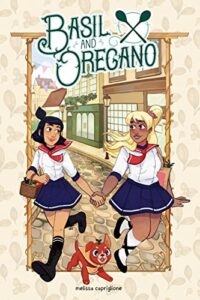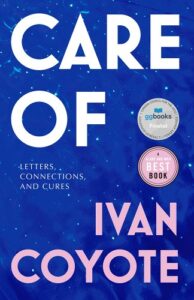Buy this from Bookshop.org to support local bookstores and the Lesbrary!
Basil and Oregano is a sweet, safe, very cute and inclusive graphic novel about two girls who fall in love while competing to become top student at their magical cooking school. While chock-full of softness and cuteness, the story also includes serious themes that keep the stakes high. I never exactly worried while reading the book—I knew things would turn out well—but I often wondered, because how would they?
Each main of the main girls faces challenges during the story. Basil has attended the same school for years, but must become top student in at least two quarter-finals to keep the scholarship that lets her follow her dream, knowing her dads can’t afford tuition. Oregano is a new student whose famous magic-using chef mom expects only the best. Luckily, between their budding relationship, excellent friends, and adorable plant-puppy, the girls have a strong support network.
The Aesthetics
Biggest warning: do not read this book at the start of a shift when your lunchbreak isn’t until four hours from now, because you will be looking at drool-worthy food!
I don’t have the strongest visual literacy, and often the deeper meanings of artwork are lost on me. Luckily, this graphic novel mixes a literal setting with amplified elements to tell even a reader like me the important pieces of the story. The food, as mentioned above, looks delicious. The familiars—a mix of magical and realistic, like a puppy growing a leaf of a cowlick or a kitten with dragon wings—are beyond adorable. In some ways, the art style cranks up to eleven. But it also stays safe. Even when danger looms, something stylistic assures you: it’ll be okay in the end.
The Relationship
“Relationship” is a better descriptor than “romance,” because this isn’t exclusively a romance. This is a story about two competitors with mutual crushes who become friends and how that develops into something more. It’s sweet and gentle. Anyone who does any sort of cooking knows basil and oregano get along, and these two are no exception! They work well together. They help each other through different challenges, such as family stress and educational burnout.
I appreciated the lack of relationship drama. The girls sometimes worry about each other, but resolve matters with communication and kindness. It was just what I like in a story.
At the same time, other relationships shine throughout the story. Basil and her besties, Villy and Addy, are friends and competitors at once. Her dads love her, even if they can be so embarrassing sometimes. Teachers at the magiculinary school are tough, but not without compassion for their students.
The Conflict
If I have a criticism of this book, it’s that its conflicts are resolved too tidily. That might sound both silly and expected—haven’t I been going on about how sweet and cute and gentle this book is? Well, yes, I have. But to me, the mean girl crosses a line that is just not addressed when she eavesdrops and blackmails Oregano. Oregano’s mom is cruel, and it’s sort of shrugged off with a hug. This may be more of a flaw in myself as a reader. In a way, the book does challenge me to consider that: everything has worked out well, so why can’t I be happy with that? But I do wish some of the themes that challenge characters throughout the book were less simply concluded.
That’s my perspective, though. Maybe you want to read a fluffy book with a fluffy ending. Either way, I strongly recommend Basil and Oregano. Is it perfect by the standards of a nitpicky reader? No. Is it still a five-star read? Definitely!
The Herbs
Since I brought it up, both are delightful! Basil has a lovelier taste and oregano is easier to grow.


